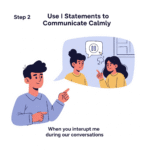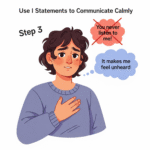Anger is normal human emotion which is triggered by stress, frustration, and trauma. A threatening situation or sense of guilt also arouses anger. It is normal to get angry but getting out of control during a situation is something which is needed to be managed. It has negative consequences on personal as well as professional life. It also affects interpersonal relationships.
Here we are going to tell you about some strategies which are helpful in managing anger issues.
Recognising Early Signs
First step is always recognition whenever you want to resolve an issue or problem. In anger management it is essential to recognize that you are angry. Whenever you feel angry the very first sign is heart rate. Heart beat starts to increase and you start to feel very hot and you try to cope with it by clenching fists. As soon as you identify any of these signs you need to calm down before your anger takes you in wrong direction.
To avoid negative consequences of anger it is necessary to manage and control your anger in positive way. Here we are going to provide you with some basic anger coping techniques and strategies.

It is important to identify the cause and effects of anger then you will be able to control it. Anger is a natural emotion triggered by various factors such as stress, frustration, some childhood trauma, or feeling threatened. Uncontrolled anger can lead to negative consequences in both personal and professional life.
The first step in anger management is to recognize the early signs of anger. These signs can include increased heart rate, clenched fists, or feeling hot. By identifying these signals, you can intervene before your anger escalates.
Anger Management Techniques
To avoid negative consequences of anger it is necessary to manage and control your anger in positive way. Here we are going to provide you with some basic anger coping techniques and strategies.
Take Deep Breaths
As soon as you identify first sign of anger that is increases heart rate and tension in muscle you need to sooth yourself by taking deep breaths. This is very simple yet very effective technique to subside anger and to relax tension of muscles and heart. You need to practice deep breathing to control yourself in better way. To practice deep breathing follow the following method:
Inhale Slowly
You need take a long breath and inhale the air slowly through your nostrils. It will allow your lungs to fill with air and in the process of inhaling your abdomen expands.
Hold Your Breath
After inhaling enough of air slowly, you need to hold your breath for a few seconds. This holding of breath will actually help you to stop your anger from escalating.
Exhale Slowly
After holding your breath for a few seconds exhale the air though your mouth slowly and steadily. While you are exhaling try to focus your mind on point that you completely exhale the air out of your lungs. This process will help you to relax and calm your mind.
Repeat this cycle of inhaling, holding breath and then exhaling for many times. In the beginning it will be difficult to focus but with practice you will be able to manage your anger without getting into serious situation.
Count to Ten

Another effective and easy method to manage anger is to simply start counting from one to ten. This is classical approach to reduce anger which provides you time to calm your nerves and focus your thought in positive way. You will get time to understand the situation and will collect your thought and emotion to get out of angry situation without reacting impulsively.
Step back:
If it is possible for you then physically go away from the situation which is arousing anger in you. In such situation give yourself some time and space.
Count slowly:

Now to calm your nerves start counting from one to ten. Start to count in your mind slowly and focus on each number but if you are find yourself to focus then count loudly and focus with all your senses on numbers.
Breathe deeply:
Now take deep breaths as well as continue counting. These two anger coping strategies will further calm your mind and help you to reduce and manage your thought in more productive way.
Now after counting you will find yourself in better condition and you will somewhat gain control over your anger as well. So you will be able to react more mindfully that rationally according to situation.
Use “I” Statements
One more technique which is used effectively is to communicate. Communication helps you to reduce your negative emotions which are building in your mind and body. The best way of this strategy is to use “I” statement. By using this stamen you need to blame yourself rather than others. Here is the method of using this technique:
Express your feelings:
You need to start your statement with “I feel…” to express your emotional reaction (e.g., “I feel frustrated when…”)
Describe the behaviour:
You need to mention more appropriately and clearly the situation or behaviour which was the reason for your anger.
State the impact:
Now you need to explain to yourself that how particular situation or behaviour affected you emotionally y and destructively.
To make you understand it better let’s explain it more deeply. You need to say “I feel ignored when you interrupt me during our conversations” rather than saying “ You never listen to me” This approach will encourage the other person to understand your point of view without feeling offensive. It will also help you to calm your nerves.
Practice Empathy
It is best approach to reduce your anger. We define empathy as to place oneself on other person’s place. It is to understand their perspective as well. You need to understand their point of view. Although it is very difficult and challenging to put yourself in other’s shoe but once you will understand their point then it may help you to reduce your anger and develop mutual understanding. It also helps you to develop good relationship with others. Here are some ways to practice empathy:
Listen actively:
You need to pay attention to others words and gestures. This will help you to better understand their position.
Validate their feelings:
You must acknowledge their words, gestures and emotions; even though you are disagree with their point of view.
Seek common ground:
If you are disagree with other person point of view you may be agree with other point. So you need to find common ground to reach an agreement.
By showing empathy, you will be able to reduce tension and will also have productive and constructive interaction. Your mutual understanding will also increase by practising empathy. You can build rapport and diffuse tension, leading to more constructive interactions.
Take a Time-Out
When you feel that your anger is getting more intense, you take a break from that provoking situation. This will help you to de-escalation of conflict and situation. This management technique will help you to overcome your anger. Here we are going to tell you how it will help to overcome your anger.
Communicate calmly:
First step is communication. You need to inform other person that you are not feeling good about that situation or behavior and you need a break to calm yourself.
Remove yourself:
After communicating effectively you need to remove yourself physically from that particular situation. if it is possible, then take a walk or step into another room.
Engage in calming activities:
Use this time-out from provoking situation to engage yourself in activities which help you to relax your nerves and regain your calm. These activities include deep breathing, listening to soothing music, or practising mindfulness.
Now when you start to feel calmer and comfortable then return to the conversation or situation it will allow you for a more productive discussion and it will also reduce the chance of saying or doing something which is regretful.
Now when you start to feel calmer and comfortable then return to the conversation or situation it will allow you for a more productive discussion and it will also reduce the chance of saying or doing something which is regretful. .
Exercise Regularly

Regular physical activity is not only beneficial for your physical health but also plays a crucial role in managing emotions like anger. Exercise helps the body to release built-up tension and stress hormones as a result production of endorphins, which makes you calmer and composed. Consider incorporating activities such as:
Aerobic exercises:
Use aerobic exercises to enhance your good mood like Running, cycling, or dancing. They will help to boost your heart rate and also will improve overall fitness. AS a result you will get stronger both mentally and physically.
Yoga or tai chi:
You need to engage yourself in practices which involve both mind and body. These mind-body exercises promote physical postures with breathing exercises and helps in relaxation and mindfulness.
Strength training:
Another training which is effective in this regard is lifting weights or using resistance bands to build muscle and it also helps to reduce tension.
You need to find activities which are enjoyable for you. They can make it easier for you to incorporate regular exercise into your routine, enhancing your ability to manage anger and stress.
Seek Professional Help
If you find it difficult and challenging to control your anger despite using and practising these strategies and techniques, then you need professional support from a therapist or counsellor who is specialised in anger management. A professional can provide you with personalised guidance and techniques according to your specific needs, and provide you help to understand and explore the triggers which cause anger. It will be helpful in developing long-term strategies to cope your anger.
Building Long-Term Habits
In addition to these specific strategies to manage your anger, it is also beneficial to develop long-term habits which can significantly enhance your ability to manage anger over time:
Practice relaxation techniques:
It is essential to build long term anger management strategies and techniques such as meditation, progressive muscle relaxation, or guided imagery. These relaxing strategies will help you to maintain your calmness. A person who wants to control his emotions for longer period of time needs to practice and develop long term habits to maintain his calm and composure.
It is essential to practice and include them into your routine life. These strategies and exercises are helpful in developing long term relationships and having a productive professional life. They will make stronger both mentally and physically.
Improve communication skills:
One is needed to work on enhancing his communication skills because communication is the key to better understand behaviour of others. Effective communication includes active listening and assertiveness and expressing your feelings in a better way which is acceptable for others as well. If you have a good listening and communicating ability then it will help you to deal effortlessly in various situations. It will be helpful for you to manage your anger in better way without creating conflicts.
Reflect and learn:
Once you experienced anger and you don’t want to build anger in such situations again then it is essential for you to reflect at the situation objectively. There must not be any subjected feeling while reflecting over the situation which had provoked you. You need to find what actually triggered inside you and how you responded to that anger.
When you will reflect those provoking situations and behaviours objectively then you will be able to learn your anger patterns. Learning and making positive changes in those patterns will help you to change your behaviour and have a control over your emotions.
By consistently applying these strategies and habits, you can cultivate greater emotional resilience and foster healthier relationships with others and manage your anger issues by yourself.
Conclusion
It is a skill to control your anger that requires practice, consistency and dedication. If you successfully include these strategies and techniques into your daily life and develop self-awareness, then you will be able to counter and manage your emotions in better and constructive way. You need to improve your communication skills, and need to build stronger connections with others. It will also help you to develop long term inter personal relationships.
It is important to remember that the goal is not to eliminate anger entirely because it is a normal emotion. But you need to learn that how to respond in a way that promotes positive outcomes and personal growth. You need to have patience and persistence, then you can achieve greater emotional balance and well-being.








